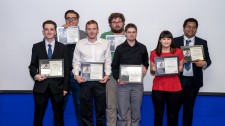Exceptional Minds Class of 2019 Begins Careers in Digital Arts

LOS ANGELES, June 11, 2019 (Newswire.com) - After three years of technical and work-readiness training, the Exceptional Minds class of 2019 ended their formal education on Friday and began their professional careers in the competitive digital arts fields.
The 2019 graduating class made up of six men and one woman on the autism spectrum is the sixth graduating class for Exceptional Minds, a pioneer in autism employability, self-sufficiency, and inclusion and belonging. “These grads are an example of what the potential and possibilities are for individuals with autism,” said Exceptional Minds Executive Director Jeff Shapiro, who addressed family and friends during Friday’s commencement at the school in Sherman Oaks.
Exceptional Minds is a professional training academy and studio with a mission to prepare individuals on the autism spectrum for careers in the fields of visual effects, animation, titles, and animation and rigging for games. Full-time program graduates Chris Iddamalgoda, Peter Jensen, Jacob Riess, Russell Sayre, Luke Shneour and Quinn Wright as well as Alex Adlawan join an alumni body of Exceptional Minds graduates who have gone on to work for entertainment companies such as Marvel Studios and Cartoon Network and to complete visual effects for major motion pictures and animations for entertainment organizations such as Sesame Workshop.
“Our ability to interpret the world differently … can have challenges. Despite the impediments that were laid down in front of us … we stayed focused and became an exceptional mind,” said graduate Chris Iddamalgoda, who will begin his career in animation with an emphasis in game rigging as an apprentice in the Exceptional Minds studio.
Exceptional Minds academy opened its doors in 2011 and in 2014, opened a professional studio to bring in contract work for graduates of its three-year program. Since then, Exceptional Minds artists with autism have completed projects for more than 196 movies and television shows, including Oscar-nominated movies Avengers: Infinity War, Black Panther, First Man, Green Book and Solo: A Star Wars Story as well as recent blockbuster Avengers: Endgame and for notable TV shows such as Game of Thrones, The Good Doctor and Atypical. Exceptional Minds clients include Sesame Workshop, Disney, HBO, Marvel Studios, Netflix, NBCUniversal, Sony Pictures and Warner Bros., among others.
During Friday’s graduation, the students and staff awarded Exceptional Minds founding board member Helen Wu with its Exceptional Minds Ed Asner Award. The award is named after the school’s most notable founding advisor and is presented annually to a champion of Exceptional Minds and its cause to transform expectations for autism employability. Wu is the seventh recipient of the award, following Gretchen Libby of Industrial Light & Magic, Robert Sorcher of Cartoon Network, Holly Schiffer of HBO, Victoria Alonso of Marvel Studios, Sam Nicholson of Stargate Studios and Ed Asner himself.
“The common core belief that brought us all together was that we needed to create a place of belonging. And not just a place of belonging at Exceptional Minds, but the belief that [people with autism] belong and deserve to be in greater society and achieving all the great things that everybody wants in life,” said Wu, who served as board chair the first six years of Exceptional Minds’ existence. One of her many achievements was to help create independent housing alternatives for her son on the spectrum as well as the students at Exceptional Minds.
Graduating along with the full-time students on Friday was Alex Adlawan, the first to complete the academy’s Freelance Exceptional Artist Program (FLEAT), which is part of the school’s growing initiative to reach a wider autism population through workshops, private tutoring and virtual online instruction.
The training academy now annually serves an average of 250 full-time, part-time and privately tutored students (as well as graduate artists), providing technical as well as behavioral training to a population sorely underrepresented in both the labor market and society as a whole.
According to the U.S. Department of Labor, 84 percent of adults with autism are unemployed and many more are underemployed.
The U.S. Center for Disease Control estimates that one in 59 kids is now diagnosed with autism.
Source: Exceptional Minds